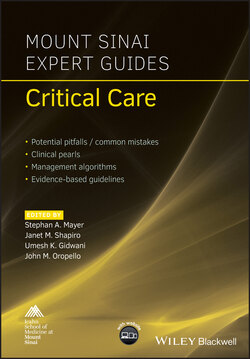Читать книгу Mount Sinai Expert Guides - Группа авторов - Страница 174
Cardiovascular complications
ОглавлениеCardiovascular complications such as myocardial ischemia and cardiac arrhythmias pose an acute and life‐threatening risk to ICU patients. Cardiac tachyarrhythmias can arise from a patient's intrinsic cardiac disease, or from medications. Hemodynamic monitoring is essential in the ICU for careful patient management and to determine the etiology of changes in cardiac performance.
Bedside TTE use has gained popularity since the 1990s and has now become an important instrument in assessing the cause of and appropriate response to most hemodynamic disturbances.
We recommend the early use of goal‐directed bedside TTE in patients with hemodynamic instability, particularly those with increasing need of hemodynamic support to identify underlying treatable causes and help guide fluid resuscitation. Cardiac ultrasound allows intensivists to narrow the differential diagnosis and rapidly diagnose and initiate treatment.
Cardiac arrhythmias are a commonly encountered problem in the ICU. Preventable factors leading to arrhythmias include electrolyte abnormalities, catecholamine excess, and drug‐related adverse effects. Patients should be closely monitored for signs of cardiac ischemia with ECG and cardiac biomarkers. ECG monitoring for QT prolongation with close follow‐up can help in avoiding arrhythmias such as torsades de pointes.
QTc intervals should be particularly monitored in those receiving medications such as procainamide, amiodarone, certain antibiotics (erythromycin, pentamidine, ketoconazole), tricyclic antidepressants, and haloperidol.
Lastly, electrolyte abnormalities, particularly in hypokalemia, hypocalcemia, and hypomagnesemia, should be aggressively and appropriately repleted to prevent and often treat certain arrhythmias.
